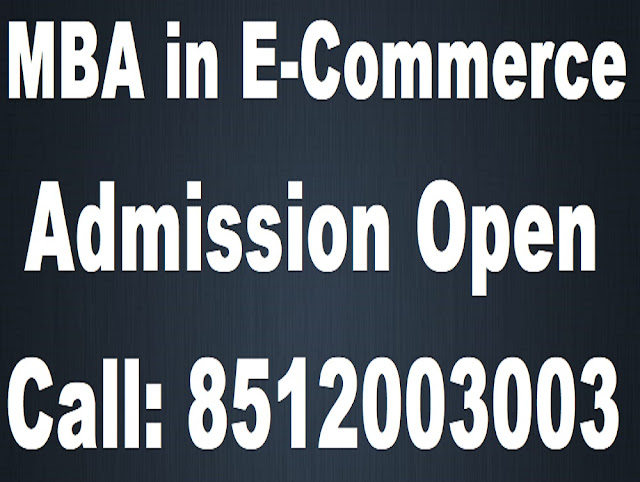MBA in E-Commerce Marketing Admission 2023-2024 for Master of Business Administration in E-Commerce
An MBA in e-commerce marketing is a graduate-level program that focuses on applying business principles and strategies to the rapidly growing field of e-commerce. Students in the program learn about the latest trends and technologies in e-commerce, s well as how to effectively market products and services online. The curriculum typically includes subjects and coursework in digital marketing, e-commerce platforms and software, consumer behavior, and business analytics. Graduates of the program will be well-prepared for a leadership role in e-commerce companies and other organizations that rely on digital channels to reach customers.
MBA E-Commerce Marketing Admission Eligibility
To be eligible for an MBA in e-commerce marketing, most universities and business schools typically require applicants to have a bachelor’s degree in a related field, such as business, marketing, or computer science. Additionally, many programs require applicants to have a certain amount of work experience, typically 2-3 years, in a related field. Some programs may also require applicants to take the Graduate Management Admission Test, the GMAT, or the Graduate Record Examination, the GRE.
Other specific MBA eligibility requirements may vary depending on the institution. Some institutions may also require applicants to submit letters of recommendation, a resume, and a statement of purpose. It’s always best to check the specific requirement of the institutions of your choice.
MBA E-Commerce Marketing Admission Process
The MBA Admission process in e-commerce marketing may vary slightly depending on the institution, but generally, it includes the following steps:
- Apply: This typically includes basic personal and educational information, test scores, and transcripts. Provide additional materials: Some programs may require applicants to submit resumes, letters of recommendation, and purpose statements.
- Take an entrance exam: Many programs require applicants to take the GMAT or GRE.
- Attend an interview: Some programs may require applicants to participate in an interview with an admissions committee or a faculty member. It is an opportunity to discuss your qualifications and goals in more detail.
- Please wait for a decision: After the applications are reviewed, the admissions committee will notify applicants of their decision.
- Complete any additional requirements: If accepted, applicants may be required to submit supplemental materials or complete a background check before being officially enrolled in the program.
It’s important to note that the process may vary depending on the institution, so it’s always best to check their website for the most up-to-date information.
MBA E-Commerce Marketing Subject List
The subjects covered in an MBA in an e-commerce marketing program can vary depending on the institution, but some common subjects include.
- Digital Marketing: This covers strategies and techniques for online advertising, social media marketing and search engine optimization, and email marketing.
- E-Commerce Platform and Software: This covers the technical aspects of e-commerce, including website design, content management systems, and payment gateway integration.
- Consumer Behavior: This covers the psychological and sociological factors influencing online consumer behavior.
- Business Analytics: This covers using data and analytics to make strategic business decisions.
- Strategic Management: This covers the development and implementation of business strategies, including strategic planning and decision-making.
- Supply Chain Management: This covers all activities in sourcing and procurement, conversion, and logistics management.
- Global E-Commerce: This covers the impact of e-commerce on worldwide business and the challenges and opportunities of operating in different cultural and economic environments.
- Business Ethics and Law: This covers ethical issues and legal considerations related to e-commerce, such as data privacy and intellectual property.
- Project Management: This covers the management of projects, including budgeting, scheduling, and risk management.
10. Entrepreneurship: This covers creating and growing a new business venture, including market research, business planning, and fundraising.
Note: The list of subjects may vary from institution to institution. It’s recommended to check the website of the institution of your choice for the most up-to-date information.
MBA E-Commerce Marketing Benefits
An MBA in e-commerce marketing can provide several benefits to graduates, including:
- Career Advancement: Graduate of the program will be well-prepared for leadership roles in e-commerce companies and other organizations that rely on digital channels to reach customers.
- Specialization: An MBA in e-commerce marketing provides a specialized skill set in great demand in today’s digital economy.
- Networking Opportunities: The MBA program provides opportunities to network with other professionals in the fields, which can lead to precious connections and job opportunities.
- Understanding of Digital Marketing: The program provides the knowledge and skills to understand and implement digital marketing strategies, which are essential for business in today’s digital age.
- Understanding of E-Commerce Platform and Software: The program provides the knowledge and skills to navigate and manage e-commerce platforms and software.
- Understanding of Consumer Behavior: The programs provide a sense of consumer behavior, which is essential for effective e-commerce marketing.
- Understanding of Business Analytics: The program provides an account of using data and analytics to make strategic business decisions.
- Flexibility: Many institutions offer online MBAs in e-commerce marketing, which allow students to study while working or pursuing other commitments.
- Personal and Professional Growth: MBA programs help students develop leadership, critical thinking, problem-solving, and communication skills.
It’s important to note that the benefits may vary depending on the institution and the student’s personal and professional goals. It’s always best to research the program thoroughly to determine if it aligns with your goals.
MBA E-Commerce Marketing Scope and Job Opportunities
The scope of an MBA in e-commerce marketing is wide and varied, as it covers various aspects of digital marketing and e-commerce. Graduates can find job opportunities in multiple organizations, including e-commerce companies, retail businesses, digital marketing agencies, and technology companies. Here are some potential career paths:
- E-Commerce Manager: E-commerce managers develop and implement e-commerce strategies to drive more online sales and revenue.
- Digital Marketing Manager: Digital marketing managers develop and implement digital marketing campaigns across various online channels, such as search engines, social media, and email.
- Online Marketing Manager: Online marketing managers are responsible for developing and executing online marketing campaigns to drive website traffic and conversions.
- Customer Relationship Manager: Customer Relationship Managers develop and maintain a relationship with customers and partners to increase sales and revenue.
- Business Development Manager: Business Development Managers work to analyze and capitalize on new business options for the company.
- Supply Chain Manager: These Managers are responsible for developing, managing, and marketing products throughout the product life-cycle.
- Entrepreneur: An MBA in e-commerce marketing can also open the door for entrepreneurship opportunities in the digital marketing and e-commerce industry.
It’s important to note that job opportunities are not limited to these. The job market is regularly evolving, so it’s always good to watch for new and emerging opportunities.
In general, MBA in e-commerce marketing is an excellent investment for those looking to build a career in the e-commerce field and take advantage of the growth opportunities in this industry.







No comments:
Post a Comment